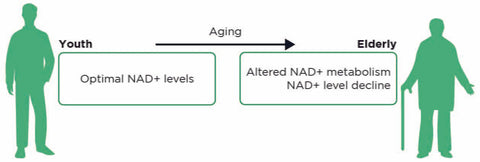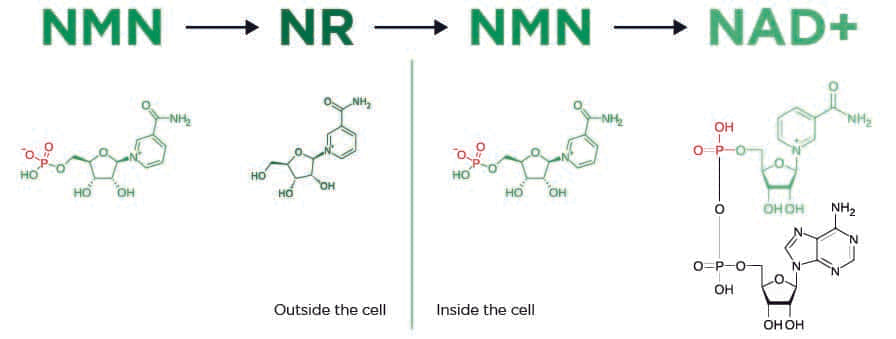In this article, we will explain what is NMN, why it is illegal and what is the legal alternative.
What is NMN?
NMN, or nicotinamide mononucleotide, is a natural molecule found in every living cell in the body. It is a precursor of the molecule NAD+, which plays an important role in energy metabolism and cell function.
Why is NAD+ important?
NAD+ is abundant in mitochondria, the cell cytoplasm and the nucleus. It is crucial for regulating cell growth, energy metabolism, stress resistance, inflammation, circadian rhythm and nerve cell function.
The body converts NAD+ from sources such as NMN, tryptophan, nicotinic acid, nicotinamide riboside and nicotinamide. These NAD+ precursors are found in small amounts in natural foods, such as cow's milk, vegetables and meat.
The average NAD+ concentration is several times lower in adults than in newborns. This decrease in NAD+ levels is attributed to:
- Diminished synthesis: the body does not produce as much NAD+ as it used to, contributing to the drop in levels.
- Increased consumption: the body consumes more NAD+ than before, also contributing to the drop in levels.

Reduced NAD+ levels are associated with a host of features of ageing.
Why is NMN illegal in Europe?
The sale of NMN is not allowed across Europe. Indeed, in November 2022, the European Commission assessed that NMN is an unauthorised novel food whose safety needs to be investigated first.
According to EU regulations, any food not consumed "to a significant degree" before May 1997 is considered a novel food. This category includes new foods, food from new sources, new substances used in food and new ways and technologies to produce food.
NMN is only authorised when the European Food Safety Authority (EFSA) has assessed the substance NMN as safe. EFSA carries out its safety assessment based on dossiers provided by applicants. The dossiers must contain data on the composition, nutritional, toxicological and allergenic properties of NMN, as well as information on the respective production processes and the proposed applications and use levels. This application process is very costly for the applicant and has a lead time of years.
Is there a legal alternative to NMN?
Yes there is: Nicotinamide riboside (NR)!
NR, like NMN, is a molecule which the body uses to produce NAD+. NR and NMN enter the NAD+ production pathway at different points. In the cell, NR is converted to NMN, then to NAD+. NR can enter the cell directly, but NMN is converted to NR before it can enter.

NR is available as a supplement and an excellent legal alternative to NMN. NR, like NMN, is a Novel Food. Nicotinamide Riboside, on the other hand, is EFSA-approved and has been on the market for a few years. ChromaDex, the applicant for the Novel Food approval of Nicotinamide riboside, publishes many scientific studies on the benefits and safety of NR.[1][2][3][4][5][6][7][8][9][10][11][12][13]
Check out our collection of Nicotinamide Riboside supplements.
- Nicotinamide riboside is uniquely and orally bioavailable in mice and humans ↩︎
- An open-label, non-randomized study of the pharmacokinetics of the nutritional supplement nicotinamide riboside (NR) and its effects on blood NAD+ levels in healthy volunteers ↩︎
- Chronic nicotinamide riboside supplementation is well-tolerated and elevates NAD+ in healthy middle-aged and older adults ↩︎
- A randomized placebo-controlled clinical trial of nicotinamide riboside in obese men: safety, insulin-sensitivity, and lipid-mobilizing effects ↩︎
- Safety and Metabolism of Long-term Administration of NIAGEN (Nicotinamide Riboside Chloride) in a Randomized, Double-Blind, Placebo-controlled Clinical Trial of Healthy Overweight Adults ↩︎
- Nicotinamide Riboside Augments the Aged Human Skeletal Muscle NAD+ Metabolome and Induces Transcriptomic and Anti-inflammatory Signatures ↩︎
- Nicotinamide riboside supplementation alters body composition and skeletal muscle acetylcarnitine concentrations in healthy obese humans ↩︎
- The acute effect of metabolic cofactor supplementation: a potential therapeutic strategy against non-alcoholic fatty liver disease ↩︎
- Boosting NAD level suppresses inflammatory activation of PBMCs in heart failure ↩︎
- Nicotinamide riboside supplementation does not alter whole-body or skeletal muscle metabolic responses to a single bout of endurance exercise ↩︎
- Boosting NAD+ blunts TLR4-induced type I IFN in control and systemic lupus erythematosus monocytes ↩︎
- The NADPARK study: A randomized phase I trial of nicotinamide riboside supplementation in Parkinson's disease ↩︎
- Safety and Tolerability of Nicotinamide Riboside in Heart Failure With Reduced Ejection Fraction ↩︎










